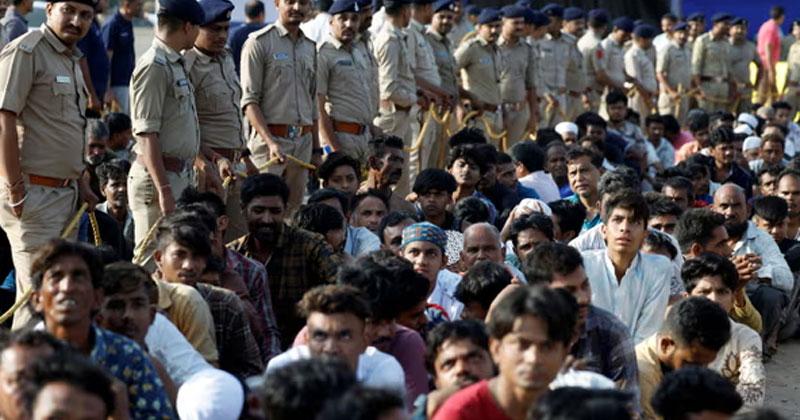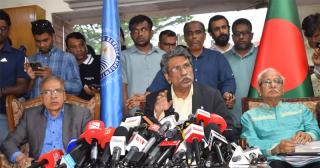
Human rights organisations have accused India's government of forcibly deporting Indian Muslims to Bangladesh, often without legal process and reportedly at gunpoint, according to an exclusive report by The Guardian.
Since April, authorities across states like Assam, Gujarat and Delhi have rounded up thousands, many Muslims, labelled as suspected illegal immigrants. Detainees allege that India's Border Security Force threatened them at gunpoint and ordered them into Bangladesh.
Among those deported and returned was Hazera Khatun, 62, a physically disabled grandmother. Khatun's daughter Jorina Begum said they had documents to prove two generations of her mother's family had been born in India. "How can she be a Bangladeshi?" said Begum.
Khatun was picked up by police on 25 May and the next day was pushed into a van with 14 other Muslims who were then driven to the border with Bangladesh in the middle of the night. There, Khatun said officers from India's Border Security Force (BSF) forced them to cross the border.
Hazera Khatun, 62, had to walk home through rivers and forests after being ‘pushed back’ from India to Bangladesh on 25 May. Photograph: Kazi Sharowar Hussain/Supplied
"They treated us like animals," said Khatun. "We protested that we are Indians, why should we enter Bangladesh? But they threatened us with guns and said, 'We will shoot you if you don't go to the other side.' After we heard four gunshots from the Indian side, we got very scared and quickly walked across the border."
The group were taken into custody by Bangladesh's border guards, and held in a makeshift camp in a field. However, Khatun said the authorities in Bangladesh would not allow the group to stay as their documents showed they were Indian citizens. They were driven a truck to the border and told to walk to India.
"When we returned, it was terrible," said Khatun. "We had to walk through forests and rivers … We were so scared, we thought if the BSF officers found us coming back, they would kill us. I was sure we were going to die." Eventually she made it back to her village on 31 May. According to her family, she was covered in bruises and deeply traumatised.
Bangladeshi officials have since repatriated around 200 individuals confirmed as Indian citizens - some forced to walk miles through forests and rivers. Rights advocates fear this marks an escalation in a broader persecution campaign.
"Instead of following due legal procedure, India is pushing mainly Muslims and low‑income communities from their own country to Bangladesh without any consent," said Taskin Fahmina, senior researcher at Odhikar.
"This push by India is against national and international law."
Bangladesh's foreign ministry has urged New Delhi to halt these deportations, but its appeals have reportedly been ignored.
The pushbacks follow India's intensified sweep - Operation Sindhoor - post the Kashmir attack in April, seen as part of a Hindu nationalist agenda that critics say disproportionately affects Muslims.
Over its 11 years in power, the BJP government has been accused by rights groups and citizens of persecuting, harassing and disenfranchising the country's 200 million Muslims as part of its Hindu nationalist agenda, charges the government denies.
The most widespread targeting and deporting of Muslims in recent weeks has been in the north-eastern state of Assam, as the BJP-run state government has escalated its long-running campaign against those it calls "infiltrators". About 100 people who have been recently detained in the state are missing, according to activists.
The expulsions were described by activists as a worrying escalation of a long-running exercise in Assam to expel "illegal infiltrators", in which Muslims are routinely called before "foreigners tribunals", quasi-judicial courts, to prove they were born in India, or arrived before 1971. A controversial citizenship survey also took place in the state in 2019, resulting in thousands being put into detention centres.
Only Muslims have to prove their citizenship after Hindus, Sikhs and other religions were made exempt from the exercise by the state government.
Meanwhile, Assam authorities have expelled over 300 individuals this May alone, and many are still stranded or missing.
Bangladeshi Border Guard chief Maj Gen Mohammad Ashrafuzzaman Siddiqui decried the tactics as "a deviation from humane governance" and urged that abandoning people in forests or forcing them into rivers "are not consistent with human rights principles".














